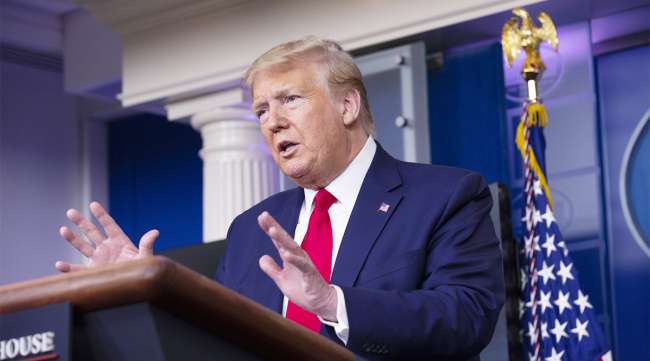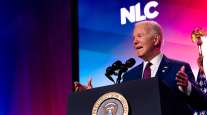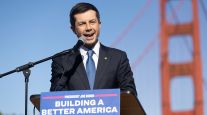Senior Reporter
Trump Touts Infrastructure Plan as Congress Eyes Expanded Aid

[Ensure you have all the info you need in these unprecedented times. Subscribe now.]
Proposals that would help the transportation sector work through the coronavirus pandemic are coming from the highest levels of government. President Donald Trump is pressing support for large investments in infrastructure funded through no-interest loans, and congressional leaders are calling for major pay increases for workers — including truck drivers — who are on the front lines of the nation’s battle against the virus.
In briefings with White House reporters, Trump has promoted a $2 trillion plan that would fix roads, bridges and other transportation systems through long-term, zero-interest borrowing. Such a plan would facilitate an economic recovery while also addressing the nation’s infrastructure needs.
“We’re going to do — perhaps — infrastructure, which you wouldn’t have gotten approved before. And now people are looking to do it,” Trump said on April 7. “And the beauty is we’re paying zero interest or very close to zero interest. In some cases, we’re paying actually zero. And the dollar is very strong, and people are investing in the dollar.”
Trump’s funding suggestion, if applied for surface transportation projects, would be a departure from the established system of relying on revenue from fuel taxes.

Pelosi
While House Speaker Nancy Pelosi has in the past agreed with the president’s desire to push forward on infrastructure — and had backed the plan of her caucus — on April 3 she pivoted to place more emphasis on emergency aid. Indeed, the massive response to the pandemic has prompted congressional leaders to temporarily set aside what had been long-standing policy items to give priority to recovery efforts.
For what would be the fourth legislation linked to the crisis, which is expected to advance this month, Democrats are calling for expanding assistance to state agencies tasked with emergency response, medical personnel and supplies, and about $250 billion in small-business loans, among other programs.
In a joint statement, Pelosi (D-Calif.) and Senate Minority Leader Chuck Schumer (D-N.Y.), said, “The heartbreaking acceleration of the coronavirus crisis demands bold, urgent and ongoing action from Congress to protect Americans’ lives and livelihoods.”
Additionally, Schumer is calling for the creation of a “Heroes Fund” that would provide a $25,000 premium pay increase for front-line workers deemed essential during the pandemic. The transit workforce and other employees in the transportation sector would be included. The increase would last through the end of the year.
“Essential front-line workers sacrifice daily for our collective health and well-being, and I, along with my colleagues, are fully committed to supplying these heroes the financial support they deserve,” said Schumer.
There also is potential for funding aimed at freight industry concerns to be included in other upcoming measures.
Senate Leader Mitch McConnell (R-Ky.), meanwhile, has not yet endorsed the president’s call for an infrastructure measure, placing focus instead on ongoing challenges nationwide.
Officials representing an array of programs and agencies continue to call for federal support amid the coronavirus crisis. This includes the American Association of State Highway and Transportation Officials, which is asking Congress to devote more attention to its concerns in the next economic aid package. With fewer people using states’ transportation systems amid the crisis, AASHTO said funding is needed to make up about a 30% decrease in revenues over the next 18 months. It said $50 billion in immediate federal funds are needed to ensure state transportation agencies continue to function without disruptions.
“Some state DOTs are already furloughing workers due to funding shortfalls and more will be faced with the same difficult decision about projects and people, unless Congress takes action,” said AASHTO Executive Director Jim Tymon.
Separately, transportation policymakers are still expected to consider an update of a highway law that expires in the fall. Prior to recent scheduling disruptions in Congress, Rep. Peter DeFazio (D-Ore.), chairman of the transportation panel, had suggested a comprehensive highway policy measure would be unveiled this spring. Congress is scheduled to reconvene on April 20.
Responding to the economic fallout, Congress approved three measures totaling about $2.5 trillion that provides funds and loans for healthcare services, small businesses and low-income individuals. Airlines, transit systems and Amtrak also received assistance.
Want more news? Listen to today's daily briefing:




